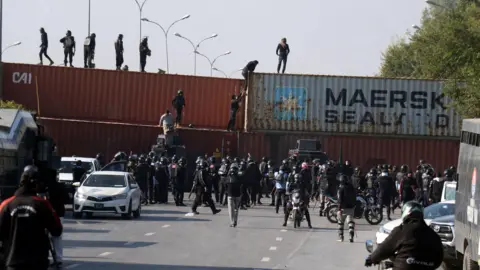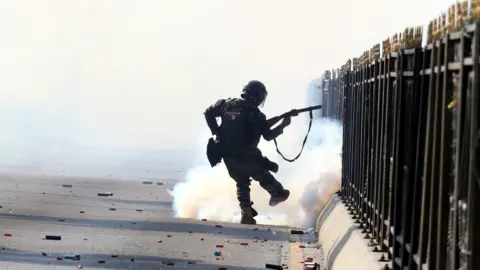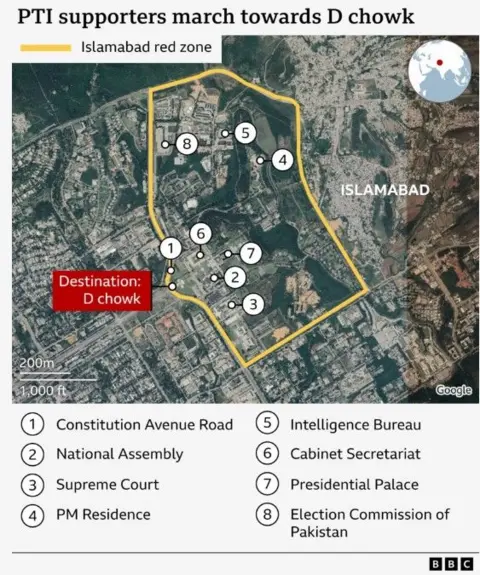Imran Khan supporters pushed back by security forces
 EPA
EPASupporters of jailed former Pakistan prime minister Imran Khan have been pushed back by security forces after reaching the heart of the heavily-barricaded capital earlier on Tuesday.
The convoy of opposition protesters has been marching towards Islamabad's D Chowk - or Democracy Square - since the weekend, demanding Khan's release, among other things.
At least six people were killed - four paramilitary soldiers, and two protesters - as the march moved through the city, clashing with security forces at points.
A number of protesters did make it as far as D Chowk however, and were seen scrambling over shipping containers placed to block their way.
But hours after protesters reached the square, security forces successfully cleared the area. As darkness fell, the lights were switched off - only police officers and paramilitary soldiers left behind.
A police officer nearby said that some protesters had made it beyond the three-tier stack of shipping containers, but only a few hundred metres before they were pushed back.
However, thousands of Khan supporters remain in the area - to keep warm in the biting cold, protesters have started burning paper and other materials inside rubbish bins. Many have even resorted to burning grass and bushes on the footpaths and greenbelts, where people are gathered.
Muhammad Shahid, who came with his family all the way from Punjab province, says they’re here because of Imran Khan’s message: “He says we must fight for our rights.”
He adds: “We’re here to stand up for our fundamental rights. Imran Khan has been illegally arrested, and we will fight to make our voices heard.”
 EPA
EPAKhan, who has been in prison for more than a year on charges he says are politically motivated, has urged his supporters not to give up - encouraging people to continue towards D Chowk.
"My message to my team is to fight till the end, we will not back down," the former prime minister said on X.
Even from behind bars, the former cricket star has proved a powerful player in Pakistan politics. During elections in February, his Pakistan Tehreek-e-Insaf (PTI) party, which had been banned from standing and was forced to run candidates as independents, emerged as the single largest bloc.
However, they fell short of the majority and their rivals united to form a new government.
As a result, protesters are also calling for the overturning of election results they say were rigged - a claim disputed by the government.
It was Khan who called on his supporters to take to the streets at the weekend, issuing a "final call" and asking them to stay in the capital until their demands are met.

The government - which had already introduced a ban on public gatherings -responded by blocking Islamabad's streets with shipping containers, and bussing in police from across the country.
Restrictions also appear to have been brought in on some internet services, while schools and colleges have been shut because of fears of violence.
Pakistan's interior minister said the protesters had been offered an alternative venue for their protest but had refused.
Prime Minister Shehbaz Sharif, who blamed the protesters for the deaths of four soldiers on Tuesday, dismissed the march as "extremism".
"These disruptive elements do not seek revolution but bloodshed," he said in a statement.
Zulfikar Bukhari, spokesman for Khan's Pakistan Tehreek-e-Insaaf (PTI) party, told news agency Reuters at least two protesters had been killed - one shot, and one run over by a vehicle.
At least 50 people have been injured.
Additional reporting by Farhat Javed, Malik Mudassir and Fakhir Munir in Islamabad
